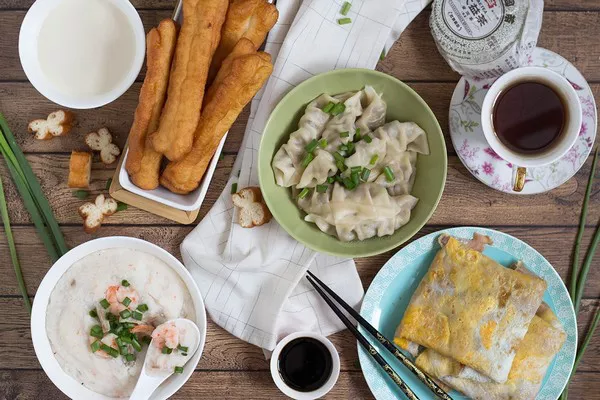Breakfast holds a special place in Chinese culture, serving as the foundation for a day filled with energy and productivity. From bustling street markets to tranquil tea houses, breakfast in China offers a wide range of flavors, textures, and aromas. In this comprehensive article, we delve into the vibrant breakfast culture in China, exploring the diverse dishes, regional specialties, and cultural significance of the morning meal. Join us on a culinary journey to uncover the rich tapestry of Chinese breakfast, from traditional favorites to modern interpretations, and discover the delightful array of options that fuel the nation’s mornings.
Traditional Breakfast Staples
a. Congee (Zhou): Congee, a popular rice porridge, takes center stage in Chinese breakfasts. It is made by simmering rice in a large quantity of water until it reaches a creamy consistency. Congee can be enjoyed plain or enhanced with savory or sweet toppings such as preserved vegetables, pickled radish, peanuts, or dried fruits.
b. Steamed Buns (Baozi): Steamed buns, also known as baozi, are a staple breakfast item. These fluffy, yeast-based buns are filled with various fillings, such as pork, vegetables, or red bean paste, offering a satisfying and portable morning treat.
c. Youtiao (Fried Dough Sticks): Youtiao, long and crispy deep-fried dough sticks, are a beloved breakfast street food. They are often enjoyed alongside congee or dipped into soy milk, providing a delightful contrast of textures.
d. Jianbing (Chinese Crepes): Jianbing is a popular street food breakfast item that resembles a thin crepe. It is made from a batter of mung bean flour and wheat flour, spread on a griddle, and topped with an egg, scallions, cilantro, and a crispy fried dough stick. It is then folded into a portable wrap, making it a convenient on-the-go option.
Regional Breakfast Delights
a. Cantonese Dim Sum: In southern China, Cantonese dim sum steals the spotlight during breakfast. These bite-sized portions of dumplings, steamed buns, and savory pastries are served in bamboo baskets and offer a wide range of flavors and textures.
b. Shanghainese Breakfast: Shanghai is renowned for its breakfast offerings, featuring dishes such as xiaolongbao (soup dumplings), savory sticky rice rolls, and soy milk served with fried dough sticks.
c. Sichuan Spiciness: In Sichuan province, breakfast embraces the bold and fiery flavors the region is known for. Dishes like spicy hotpot, dan dan noodles (spicy noodles with minced meat), and mapo tofu (tofu in a spicy sauce) are favored by those who crave a fiery start to their day.
d. Northern China’s Dumplings: In the northern regions of China, steamed or boiled dumplings filled with meat or vegetables, known as jiaozi, take center stage. These dumplings can be enjoyed with a side of vinegar and chili oil for added flavor.
e. Xinjiang’s Lamb Skewers and Naan Bread: In the Xinjiang region, influenced by Central Asian cuisine, breakfast may include lamb skewers seasoned with spices like cumin, chili, and Sichuan peppercorns. It is often paired with naan bread, yogurt, and tea.
Modern Interpretations and Fusion
a. Western-Style Breakfast: With globalization, Western-style breakfast options have become increasingly popular in urban areas. Toast with jam, scrambled eggs, and pastries can be found in many cafes and hotels.
b. Chinese-Style Breakfast Chains: Chinese-style breakfast chains have emerged, offering quick and convenient options for busy urban dwellers. These chains serve items like egg pancakes, rice rolls, and soy milk, catering to a diverse range of tastes.
c. Fusion Influences: The fusion of Chinese and Western cuisines has led to innovative breakfast dishes. For instance, egg-filled steamed buns, scallion pancakes with cheese, or milk tea-infused pastries combine traditional Chinese flavors with modern twists.
d. Nutritious and Healthy Choices: In response to health-conscious individuals, breakfast options focusing on nutrition and wellness have gained popularity. Chia seed pudding, fruit smoothies, and granola with yogurt are embraced by those seeking a balanced and nourishing start to their day.
Tea Culture and Breakfast
a. Chinese Tea: Tea is an integral part of Chinese culture, and breakfast is no exception. Green tea, oolong tea, and jasmine tea are commonly enjoyed alongside breakfast dishes, offering a refreshing and invigorating beverage choice.
b. Yum Cha: Yum Cha, or morning tea, is a tradition in some regions where people gather in teahouses to enjoy a leisurely breakfast accompanied by a variety of tea and dim sum dishes.
The Joy of Breakfast in China
a. Social and Community Bonding: Breakfast in China fosters a sense of community, as locals gather at street stalls, teahouses, or breakfast shops, exchanging greetings, and engaging in lively conversations.
b. Convenience and Variety: Chinese breakfast options cater to diverse tastes and preferences, ranging from quick street foods for those on the go to leisurely dim sum experiences for those seeking a more elaborate meal.
c. Regional Identity and Culinary Heritage: Breakfast dishes in different regions reflect the unique culinary heritage and local ingredients, allowing visitors and locals alike to experience the diverse flavors of China.
d. Nutritious and Energizing Start: Chinese breakfasts are designed to provide a balanced and energizing start to the day, incorporating a mix of carbohydrates, proteins, and flavors that fuel the body and mind.
Conclusion
Breakfast in China is a vibrant and diverse affair, offering a vast array of flavors, textures, and aromas that reflect the country’s rich culinary heritage. From traditional staples like congee and steamed buns to regional delights such as Cantonese dim sum and Shanghainese specialties, Chinese breakfasts cater to a range of tastes and preferences.
Whether enjoying a leisurely meal at a teahouse or grabbing a quick bite from a street vendor, breakfast in China is a time-honored tradition that brings people together, fosters community bonding, and nourishes both body and soul. Embrace the variety, savor the flavors, and immerse yourself in the vibrant breakfast culture of China, starting your day with a delightful culinary experience.

